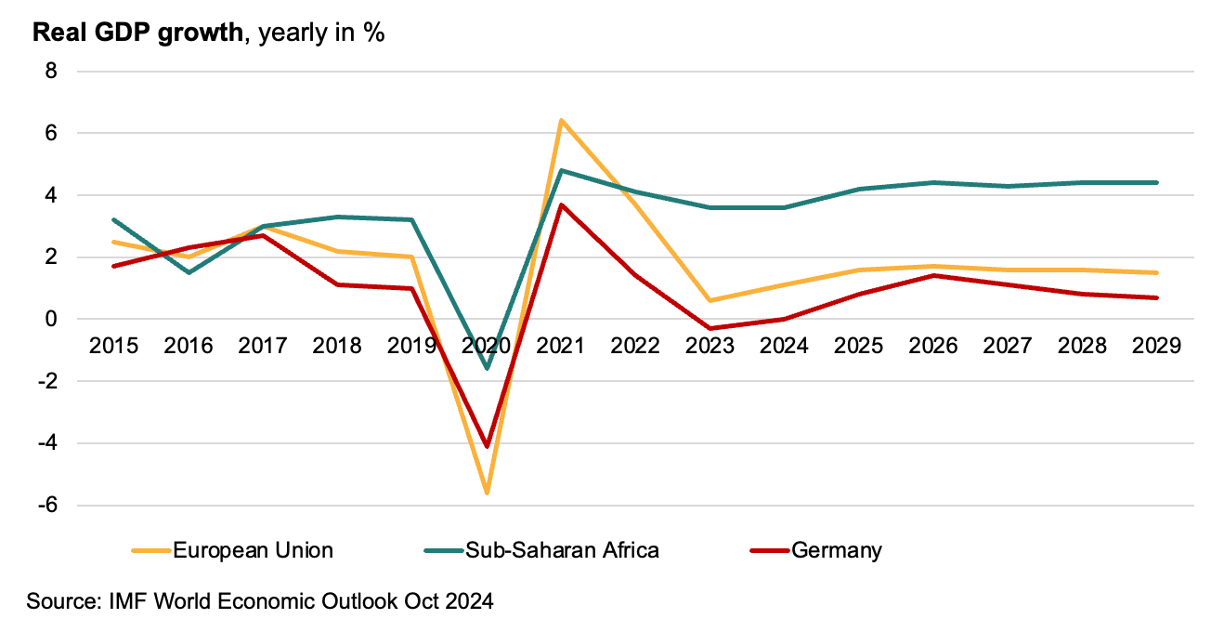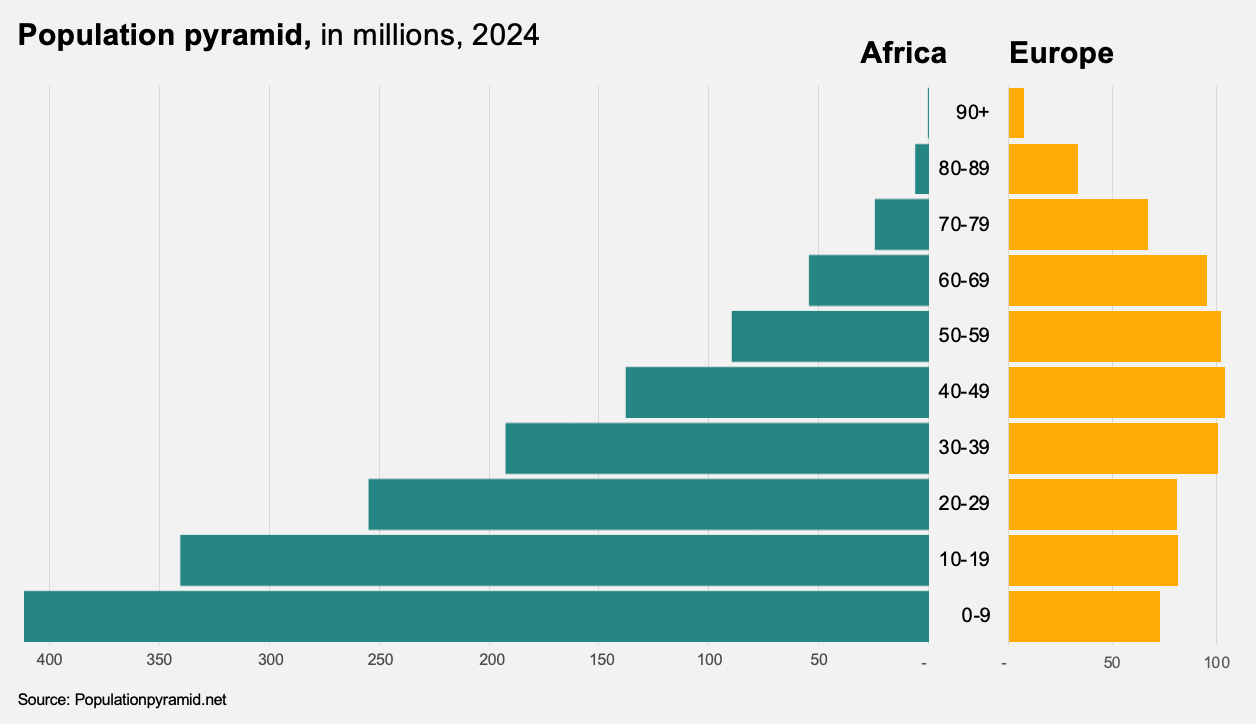Unlocking New Growth: Why German Companies Should Consider Africa
The African continent presents a compelling case for strategic expansion
The trends shaping Germany’s economy today are driving companies to seek new growth paths. Africa presents a compelling case for strategic expansion: a dynamic, rapidly evolving region with opportunities to innovate and collaborate on a global scale. By moving beyond misconceptions and embracing local partnerships, German companies can unlock new avenues for growth, resilience, and impact.
Now is the time to act. The future of innovation may not be about simply refining current models but about co-creating new solutions across continents.
Read on to learn more.
🕐 In a Hurry? Here's a 1-Minute Summary:
From Stagnation to Momentum: While German companies wrestle with an aging population and tight regulations, Africa’s youthful demographics and accelerating urbanization are redefining growth opportunities.
Distinct, Often Accelerated Development: Rather than catching up, African economies frequently take bold leaps—particularly in digital technologies—creating fertile ground for disruptive business models.
Scalable Market Potential: With comparatively underpenetrated sectors—fintech, healthcare, agriculture, and renewable energy—African markets can offer expansion paths that are increasingly scarce in Europe.
Sustainability Meets Profitability: Rich in renewable resources, Africa is adopting climate-smart solutions at scale, enabling companies to achieve both commercial and ESG objectives.
Concrete Success Stories: Knauf, Melitta, and Dräger demonstrate how tailor-made strategies and local partnerships can lead to sustained growth and positive impact in African markets.
⏳ Ready for a Deeper Dive? Here's the Breakdown:
Situation
German companies and start-ups are facing increasingly difficult growth conditions. An aging population, saturated markets, and heightened regulatory pressures limit both innovation and scalability. Leaders are under pressure to find new avenues for expansion, yet the opportunities within Europe are shrinking.
Meanwhile, Africa is charting a very different course. Although Germany’s economy—with a GDP of around $4.2 trillion—currently outstrips the combined GDP of the entire African continent (around $3 trillion), the underlying trends tell a different story. Africa’s growth is being propelled by demographic shifts, urbanization, and rapid technological adoption. Countries like Nigeria, Kenya, Rwanda, and South Africa are driving dynamic economic shifts that offer significant potential for future growth.
Complication
Despite these prospects, many German companies remain hesitant. Concerns about unfamiliar markets, infrastructure gaps, and perceived risks create uncertainty. However, much of this hesitation stems from a misunderstanding of Africa’s growth dynamics. The trends shaping Africa are not merely a delayed version of those seen in Germany—they are distinct and, in some cases, entirely opposite.
Consider these contrasts:
Demographics: While Germany faces a shrinking and aging workforce, Africa’s population is set to double by 2050, offering one of the youngest and most dynamic labor and consumer bases globally.
Urban Development: Germany’s infrastructure is highly developed but aging, with limited room for large-scale urban expansion. Africa, by contrast, is witnessing rapid urbanization, creating demand for infrastructure, mobility solutions, and urban services at an unprecedented scale.
Technological Adoption: Germany contends with slow and incremental digital transformation. Africa, however, is leapfrogging traditional technologies, building mobile-first economies and decentralized renewable energy systems.
These divergences create both a challenge and an opportunity for German businesses. Companies willing to shift their perspective can capitalize on Africa’s long-term growth trajectory.
Solution
By rethinking their strategies, German companies can position themselves to benefit from Africa’s unique growth story. Early movers will have opportunities to shape markets, build partnerships, and co-create solutions tailored to local needs.
Here’s why it makes sense to explore these opportunities now:
#1: Access to High-Growth Markets:
Africa’s expanding middle class and increasing digital connectivity are driving demand in sectors such as financial technology, healthcare, agriculture, and energy. These markets offer significant room to scale innovative solutions with less competition than in Europe.
#2: Demographic Advantage:
Africa is home to the world’s youngest population, with 60% of its people under the age of 25. This offers both a rapidly expanding consumer base and a dynamic talent pool for the future. Africa’s young, tech-savvy population is both a rapidly expanding consumer base and a source of skilled talent. Companies that invest early will gain long-term benefits from this demographic momentum.
#3: Innovation Partnerships:
Emerging African tech ecosystems such as Nairobi’s "Silicon Savannah" and Kigali’s innovation-focused initiatives are producing scalable, agile solutions to complex challenges. German companies can enhance their competitiveness by collaborating with these ecosystems through joint R&D, local partnerships, and talent exchange.
#4: Alignment with ESG Goals:
Africa is uniquely positioned to lead in sustainability, thanks to its rich biodiversity and abundant renewable energy resources (solar, wind, and hydro). The continent is already embracing climate-resilient agriculture, decentralized solar grids, and nature-based solutions to environmental challenges. Africa presents significant opportunities for sustainable investments. From renewable energy projects to digital inclusion and climate-smart agriculture, businesses can achieve both profitability and social impact.
#5: Expanding Trade and Logistics:
Africa is on the path to economic integration through the African Continental Free Trade Area (AfCFTA), which aims to create a single market for goods and services across 54 countries. This initiative, the largest of its kind globally, has the potential to dramatically boost intra-African trade and improve market efficiency. Major infrastructure projects under initiatives like AfCFTA and local investment programs are improving trade logistics and connectivity. Ports, railways, and trade corridors are being modernized to support intra-continental commerce.
Examples of Success
Several German companies are already seizing these opportunities.
Knauf: A leading German building materials company, Knauf has expanded its manufacturing and distribution networks across multiple African countries. By adapting its product range to local construction needs, it has gained a strong foothold in fast-growing urban areas.
Melitta: Known worldwide for its coffee products, Melitta has successfully navigated Africa’s diverse consumer preferences by localizing blends and leveraging regional supply chains. This strategy has strengthened the brand’s presence in retail and hospitality sectors.
Dräger: A German manufacturer specializing in medical and safety technology, Dräger has made substantial inroads in African healthcare markets. By collaborating with local partners on training and equipment maintenance, it has built long-term customer relationships and contributed to improving healthcare infrastructure.
Sources to learn more:
African Development Bank (AfDB) – African Economic Outlook with comprehensive data and analysis on Africa’s macroeconomic performance
McKinsey & Company – Reports on Africa features research and case studies on African markets, including insights into consumer behavior, digitization, and sector-specific trends such as financial services and manufacturing.
World Bank – Africa Region offers country-specific economic updates, development projects, and policy analysis. The World Bank’s “Doing Business” reports can also help entrepreneurs assess regulatory environments.
Germany Trade & Invest (GTAI) – Africa Business Guide offers insights into specific African markets, legal frameworks, and potential export or partnership avenues for German companies.
Brookings Institution – Africa Growth Initiative delivers policy briefs, expert opinions, and data-driven research on Africa’s economic transformations, governance issues, and overall development trajectory.
Enjoying out content?
Don’t keep it for yourself and share!
Subscribe to not miss future updates!
Feedback or thoughts?
Please let us know! Just reply to this e-mail. We’re happy to hear from you!
Thanks for reading,
Carolin
Disclaimer: All information provided is not intended to serve as investment advice. Any mention of industries or countries should not be taken as an endorsement.




